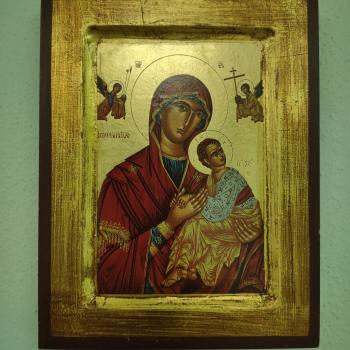We always talk about Mary during Advent and Christmas. Elizabeth is the other woman we discuss. But there is one we forget. Honestly, it is not a surprise. After all, we never see her in Christmas pageants. There is only one movie about Jesus in which we hear her. It is she who is the reason Bethlehem was remembered before Jesus. The woman who never got to hold the child to whom she gave birth. The person who died in sorrow and was remembered for it. I mean Rachel.
The Woman of Sorrow
Genesis tells her story. Rachel was the favored wife of Jacob (Israel) and the mother of Joseph. She was clever. Rachel took the terebinth from the home of her father Laban. She outsmarted him during the search of the tents. Jacob allowed Laban to search his camp for the family idols. Rachel sat over them. She then told her father she was having her period as an excuse not to stand in his presence.
Rachel’s death was tragic.
Then they journeyed from Bethel; and when they were still some distance from Ephrath, Rachel was in childbirth, and she had hard labor. When she was in her hard labor, the midwife said to her, ‘Do not be afraid; for now you will have another son.’ As her soul was departing her (for she died), she named him Ben-oni, but his father named him Benjamin. So Rachel died, and was buried on the way to Ephrath (that is Bethlehem), and Jacob set up a pillar at her grave’ it is the pillar of Rachel’s tomb, which is there to this day. (Genesis 35:16-20
This shrine Jacob set up was how Bethlehem was remembered before David and before Jesus. Her sorrow was remembered. She named her second child “Son of my Sorrow.” Jacob apparently could not live with that thought and renamed him “Son of My Old Age.” Benjamin becomes a passive but key figure in the stories of Joseph and the salvation of Israel.
Jeremiah, Micah, and Matthew
Rachel, as the woman of sorrow, became a symbol for the prophets.
But you, O Bethlehem of Ephrathah, who are one of the little clans of Judah from you shall come forth for me one who is to rule in Israel whose origin is of old from ancient days. Therefore he shall give them up until the time when she who is in labor has brought forth; then the rest of his his kindred shall return to the people of Israel. (Micah 5:2-3) (emphasis added)
Christians often associate Micah’s words with Mary and King David. His original hearers would recognize Rachel in connection to the salvation he promises with God’s voice.
Jeremiah understood this years later when he lamented the tragedy of Judah was continuing. “Thus says the LORD; ‘A voice was heard in Ramah, lamentation and bitter weeping. Rachel is weeping for her children; she refuses to be comforted for her children because they are no more.'” (Jeremiah 31:15) Rachel is associated with both tragedy and ultimate salvation of the people. Redemption will come after sorrow.
Matthew shows the two going together hand in hand. Jeremiah’s words about Rachel are used to describe the mourning of the murders of the Holy Innocents – the boys two years and younger – in Bethlehem. The Magi avoided a second encounter with Herod. Joseph takes Mary and Jesus to Egypt just before the massacre. Bethlehem is known for the manger and tragedy.
Ignoring the Woman of Sorrow
The cost of ignoring Rachel’s connection to Bethlehem and the Christmas story has left churches casting about for ways to remember that people mourn during the Holidays. Dickens used Bob Cratchit and the death of Tiny Tim to illustrate how some mourn at the time. Yet, the pressure of making a redemption story work, forced Scrooge to get Tim the help needed to keep him alive.
Blue Christmas observances toward the end of Advent are meant to help people coping with losses. But, they are merely a pause in the drive to make everything happy, joyous, and “perfect.”
I wish someone had pointed out to me the theme of Rachel mourning when I went through the worst Christmas of my life a few years ago. Family and friends reached out to me which was wonderful even though I did not fully appreciate it at the time. I attended the Christmas Eve church service. It was nice. But I could not “fake it till I made it.” I did not try.
It is normal for the first Christmas after a loss to be hard. But, without the story of Rachel, we do not realize it is normal to have difficulties during “ordinary” Christmas times. Preachers should at some time during Advent should remember Rachel along with the usual cast of characters.
















